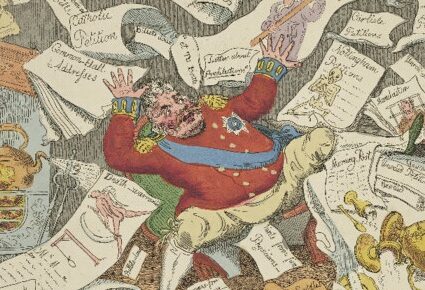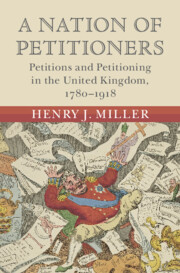
Between 1780 and 1918 over 1 million petitions were sent to the UK House of Commons. These petitions, which addressed over 33,000 issues, were signed by 165 million people. The colossal scale of petitioning in this period was unprecedented in the history of Britain and Ireland as well as in other countries. In a pre-democratic period when few men and no women could vote, petitions were the primary mode through which ordinary people interacted with politics and sought to make their voice heard.
My recent book, A Nation of Petitioners: Petitions and Petitioning in the United Kingdom, 1780-1918, is the first study of this extraordinary social and political phenomenon. In restoring the importance of petitions and petitioning to the story of modern UK political culture, the book shifts the focus away from an emphasis on elections, voting, and political parties, and traditional milestones such as the Reform Acts that have tended to preoccupy historians.
By recovering the activity of millions of petitioners, the book challenges revisionist accounts that have argued that political culture became less democratic and more exclusive as the right to vote was gradually extended across the period. Qualifying sociological accounts of popular contention, the book demonstrates that petitioning was not just one element in an emergent repertoire of collective action but underpinned and made possible a variety of other political activities.
I show, first, the enormous scale of petitions to Parliament, and the fact that many more people signed petitions than voted or were able to vote in parliamentary elections. Petitions not only increased in their quantity but were used by people to address an increasingly wide range of issues, from local complaints to major religious, humanitarian, imperial, political and social controversies, including Catholic rights, slavery, parliamentary reform, and the poor law. Bulky ‘monster’ petitions signed by tens and in some cases hundreds of thousands of people became a new way to mobilise popular support, reaching their peak with the three massive Chartist petitions of 1839, 1842, and 1848 that were signed by millions of people in support of democratic rights.
At the same time, petitions to the House of Commons were just one element of a broad subscriptional (or name-signing) culture that involved petitionary documents such as memorials and addresses being sent to all levels and types of political authority, including Queen Victoria and the prime ministers of the day.
Second, petitioners themselves reshaped the right to petition into a broad, absolute right that underpinned other forms of political activity, including public meetings and association. Petitioning was important for catalysing collective identities and making claims for rights, as the cases of Catholics, Dissenters, and women show. At the same time, while collective petitions became a vehicle for mighty popular pressure in this period, they were also used by humble individuals to seek redress, in some cases from across the British empire. For example, Annabella Hubert, a Canadian women repeatedly petitioned Parliament in the 1890s to complain that she had been driven from her house by ‘ruffians’ and had received no justice from the local authorities. At the local level, different petitioning communities, shaped by religion, trade or occupation, civil society, proliferated on different issues, injecting dynamism into grassroots politics.
One of the questions that has baffled political scientists and historians is why people petition when most petitions are and were unsuccessful? The answer, I show in the third part of my book, is that petitioning underpinned a wide range of other activity and was valuable for a variety of reasons regardless of the response from Parliament or other authorities. The practice of signature-gathering enabled various forms of grassroots politics including public meetings, while for social movements and pressure groups petitioning was crucial for political organisation and recruitment, publicising their cause, and for bringing public opinion to bear on elite politicians.
Petitioning was also vital to the practice of parliamentary representation. By presenting petitions and interacting with petitioners, MPs strengthened their claims and that of Parliament to represent the ‘people’ in an undemocratic age. The assumption underpinning nineteenth-century ‘parliament government’ was the notion that not everyone should have the right to vote, but everyone should have the right to be represented. Petitions were the principal mechanism for translating this theory into practice.
In the early twentieth century, there was a gradual shift away from petitioning Parliament and the number of petitions to the Commons collapsed completely during the First World War and never recovered to the scale of its nineteenth-century heyday. Yet, petitions did not become redundant as an increasing proportion of people gained the franchise. Rather campaigners, including famous the Edwardian suffragettes led by Emmeline Pankhurst, transformed practice of petitioning so that petitions were directed at a more diverse range of authorities, including increasing the prime minister. However, unlike petitions to Parliament, these were not formally recorded. This development explains why petitioning remained a widespread, but largely unappreciated, practice in later twentieth-century Britain.
Overall, the book emphasises the importance of practices, particularly petitions and petitioning, to present a more open, inclusive, participatory picture of political culture in this period. The centrality of Parliament is another theme, but this was double-edged. While receiving petitions could enhance Parliament’s authority, petitioners could also challenge the legislature’s legitimacy by claiming to represent a broader public than the small electorate who could vote. Petitions also provided a means to engage with, and indeed, harass all branches of the state on an almost daily basis. Not only does this suggest that accounts stressing the disciplinary powers of the state have been overplayed, but furthermore, petitions played a role in state formation and state building ‘from below’.
Finally, in recent years, e-petitions have been widely adopted in representative democracies as a way of increasing citizen engagement with political institutions. A Nation of Petitioners provides an important historical context to the proliferation of e-petitions in the UK and elsewhere. While many citizens engage with politics online, in the nineteenth century the typical mode of engagement the country was the simple act of signing a petition.

A Nation of Petitioners
by Henry J. Miller
Latest Comments
Have your say!